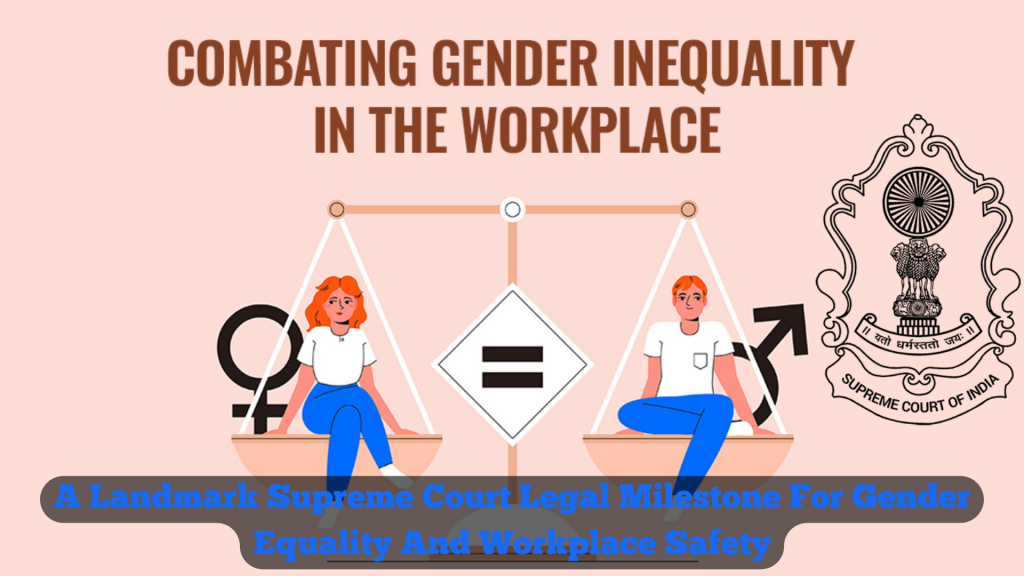
A Landmark Supreme Court Legal Milestone For Gender Equality And Workplace Safety
Judgement Given On : 13/08/1997
In 1997, the Supreme Court of India delivered a momentous judgment that reverberated across the nation, reshaping the terrain of workplace safety and gender parity. The case of Vishaka and Others v. State of Rajasthan, popularly known as the Bhanwari Devi case, emerged as a beacon of hope and justice following a harrowing incident. This watershed moment spotlighted the pressing need for protection against sexual harassment within the workplace and laid the groundwork for crucial legal reforms.
The Catalyst: The Tragic Plight of Bhanwari Devi
Central to this case were the traumatic events of 1992 when Bhanwari Devi, a social worker from a lower caste engaged in a women’s development program in Rajasthan, took a valiant stand to prevent a child marriage in her village. Tragically, her courageous act of defiance resulted in an alleged gang rape by five individuals from an upper-class community. In her quest for justice, Devi filed a complaint with the local police. However, justice remained elusive as a comprehensive investigation was not initiated, leaving her plight unaddressed.
The Pivotal Question: The Responsibilities of Employers in Cases of Sexual Harassment
This watershed case brought forth fundamental inquiries concerning the responsibilities of employers in instances of sexual harassment transpiring within the workplace. It posed a critical query: Should employers bear any measure of accountability when their employees perpetrate acts of sexual harassment against their colleagues or subordinates?
Seeking Justice: From Acquittal to Legal Appeals
In her relentless pursuit of justice, Bhanwari Devi turned to the trial court. Regrettably, the court acquitted the accused, citing factors such as the absence of medical evidence and other considerations. This verdict galvanized numerous women’s groups and organizations to challenge the judgment. The collective endeavour culminated in the filing of a public interest litigation (PIL) in the Supreme Court of India, focusing on the pressing issue of sexual harassment within the workplace.
The Landmark Ruling: A Legal Framework for Transformation
In its historic judgment, the Supreme Court declared that sexual harassment of women within the workplace violated their fundamental rights, including those enshrined in Articles 14, 15, 19, and 21 of the Indian Constitution. This ruling unequivocally established that such actions constituted a breach of women’s human rights.
Catalysing Legal Reforms
The verdict in the Bhanwari Devi case prompted the acknowledgment of a statutory void that necessitated judicial legislation to effectively address sexual harassment within the workplace. The case introduced a series of pioneering guidelines and prerequisites that employers and other responsible entities must diligently adhere to:
- Establishment of Procedures and Mechanisms: Employers or responsible individuals must institute procedures and mechanisms aimed at preventing acts of sexual harassment within the workplace.
- Mandatory Complaint Committees: Every workplace must constitute a complaint committee dedicated to addressing sexual harassment issues.
- Inclusive Representation: These committees must be led by a female employee and incorporate participation from NGOs or third-party entities.
- Gender Diversity in Committees: Half of the committee’s members must be women.
- Handling of Complaints: All complaints concerning the sexual harassment of female employees must be meticulously addressed by this committee, with employers obligated to initiate appropriate actions in accordance with applicable laws.
- Advisory and Recommendations: The committee will provide guidance and recommendations to the victim regarding the subsequent course of action.
- Defining Sexual Harassment: The guidelines encompass a comprehensive definition of sexual harassment, encompassing various unwelcome behaviours, demands, and actions by male employees, including physical contact, advances, sexually coloured remarks, displaying pornography, making lewd comments or gestures, making sexual demands, engaging in rumours or discussions featuring sexually coloured remarks, or spreading rumours regarding a woman’s sexual relationships.
The Birth of the PoSH Act
The profound impact of this landmark judgment prompted the Indian government to enact the Sexual Harassment of Women at Workplace (Prevention, Prohibition, and Redressal) Act in 2013, which came into force on December 9, 2013. This legislation superseded the Vishaka Guidelines established by the Supreme Court.
Empowering Women: The PoSH Act
The PoSH Act encompasses a spectrum of measures meticulously designed to thwart sexual harassment within the workplace. These measures include:
- Dissemination of information regarding the Act
- Provision of sensitivity training to employees
- Establishment of a secure and supportive working environment for women
Furthermore, the Act delineates penalties for employers who fail to adhere to its stipulations, encompassing fines and imprisonment. The groundbreaking judgment in the Bhanwari Devi case set in motion a transformative legal framework committed to championing gender equality and eliminating sexual harassment from both public and private employment.
A Reverberating Legacy
The Vishaka and Others v. State of Rajasthan judgment stands as a pivotal cornerstone in the fight against sexual harassment and gender-based violence, not solely within India but across the global stage. It serves as an enduring testament that justice, equality, and dignity must invariably triumph in every workplace.
